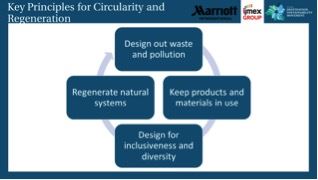The Great Restart - Regeneration
By: Melissa Baird – The GDS-Movement (UK)
A ground breaking research paper undertaken by IMEX, Marriott International and the GDS Movement presents a new paradigm in destination management and a future inspired by nature's principles for life.
Threats and Opportunities
The global pandemic is just one of many that is threatening global economic and social stability. There is rampant pollution, the decline and extinction of species and the impacts of extreme weather on vulnerable communities. As poverty increases so do the inequalities in the distribution of wealth and natural resources. This extraordinary context means it is no longer good enough to talk about sustaining a broken system, instead a focus on regenerating the social, economic and ecosystems upon which we depend is now critical.
These extraordinary factors can be put to best use by ushering in a ´great reset´. How can we rethink, reimagine, and redesign a new restorative, resilient, inclusive and zero carbon growth model? By doing so we can restore and rejuvenate the planet, its people and create a heathier economy.
Wasted Resources
Every year more than 100 billion metric tonnes of raw materials are extracted and converted into products. Less than 8.6% of these materials are recycled back into the economy. While millions go hungry, 30% of the food produced is wasted equating to 6% of global emissions, more than double those produced from flying.
The report highlights the plastic pandemic. If plastic use were a country, it would be the fifth largest emitter of greenhouse gases in the world. A staggering 91% of plastic is not recycled which means 11 million metric tonnes enter the ocean each year. This annual flow to the oceans is predicted to triple to 29 million metric tonnes by 2040. By 2050, plastic production and incineration (at its current rate) could triple to 2.8 gigatons of CO2 per year, releasing emissions equivalent to 615 five-hundred-megawatt coal plants.
These are big numbers but the impacts on marine life and coastal communities will be more than just big numbers.
Circular Solutions
In nature there is no such thing as greed or waste and the infinitely complex system self regulates to ensure balance and conditions conducive to life. In the critical times we are facing, we need to be inspired by natural, functioning systems, and work in collaboration with innovators to improve our planetary and social impact.
Accenture calculated that the circular economy is the world's largest opportunity, with the potential to unlock $4.5 trillion growth. Cambridge Economics estimates that applying circular economy principles across the EU economy has the potential to create around 700,000 new jobs and create a net benefit of €1.8 billion by 2030.
 In a circular and regenerative economy, economic activity builds and rebuilds overall system health. It is restorative and regenerative by design. The concept recognises the importance of the economy needing to work effectively on all levels – for big and small businesses, for organisations and individuals, globally and locally.
In a circular and regenerative economy, economic activity builds and rebuilds overall system health. It is restorative and regenerative by design. The concept recognises the importance of the economy needing to work effectively on all levels – for big and small businesses, for organisations and individuals, globally and locally.
HANNUWA - a Framework for Regeneration

The GDS Movement has developed a framework and set of tools that support event suppliers, organisers, and educators on their journey of transformation. Their approach is summed up in the word: Hannuwa, an ancient San word from South Africa that means the gathering of good fortune through living in harmony with our natural environment.
It comprises of four key principles and an eight-step methodology, which serves to educate and guide event organisers towards more regenerative event management that includes considerations of designing for inclusivity and diversity.
A Regenerative Future, Inspired by Nature
Regenerative events have a focus on quality, effectiveness, harmony, and wellness. They are circular by design aiming for energy, natural resources, and materials to be conserved, enriched, reused, recycled and used to enhance equitable development. They design out waste and pollution, and improve resilience by increasing diversity, inclusivity, and equality. They also focus on regenerating and rejuvenating natural systems and communities.
Taking the First Step
A key purpose of the research is to pose important questions to the meetings and events industry that catalyse dialogue and stimulate debate and collaboration. It is the first in a series of #Natureworks research papers sponsored by IMEX and Marriot International) showcasing outstanding examples of initiatives in the events sector tackling food waste, show waste, social unity and stability that have utilised circular strategies for the benefit of all stakeholders.
“A return to ‘business as usual’ would not just be a monumental failure of imagination, but lock in the inequities laid bare by the pandemic and the inevitability of more devastating crises due to climate breakdown” - C40 Mayors Agenda for a Green and Just Recovery

“In an ecosystemic approach pollution, greed, unemployment, waste, inequalities and poverty - among others - are human inventions. Thus, they can and should be designed out of our next model of life.” - Alexandre Lemille
Considering the Whole Value Chain
To activate regenerative strategies will require engagement, collaboration, and empowerment across the entire stakeholder base. Every link in the chain has a social, environmental, and economic impact and as such each are responsible for co-creating solutions that will transform not only the sector but everything that is affected and dependent on it. Collaboration is key and all stakeholders from local government, academia, businesses, NGOs, and social enterprises can contribute to create nature-based solutions that regenerate local ecosystems and improve people’s livelihoods in the face of climate threats and social change.
“The word regenerative means creating the conditions conducive for life to continuously renew itself, to transcend into new forms, and to flourish amid ever-changing life-conditions.” - Regenerative Leadership by Giles Hutchins and Laura Storm
-----
About the GDS Movement - The GDS-Movement unites and enables destination management professionals to create flourishing and resilient places to visit, meet and live in. Our mission is to co-create sustainable and circular strategies, mindsets and skill sets that will enable destinations of the future to thrive, and society and nature to regenerate.
Download the full report The Regenerative Revolution
